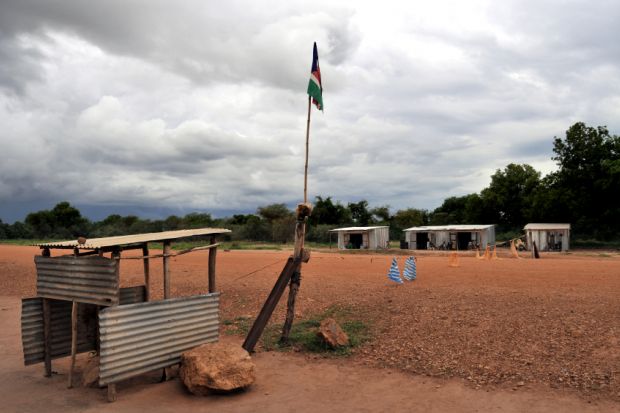Register now to attend the Times Higher Education Africa Universities Summit
When South Sudan became independent in 2011, there were hopes that higher education, and education in general, would top the national spending priority list. The country has six universities, five of which are public and one of which is private, with the number of students in the country estimated at between 25,000 and 30,000.
Since 2011, however, budgets have been reduced as part of national austerity measures. To make matters worse (to say the very least), when the country entered into what I personally call a war of insanity in December 2013, public universities were badly affected, with students, faculty and staff displaced, and assets destroyed. Now, at certain times, university administrators are challenged with the question of whether to close universities or keep them open. It is hoped that the recent peace deal between the government and rebels will be sustainable and provide tangible solutions, but higher education institutions in South Sudan still face basic challenges.
Violence and insecurity
The most important challenge to higher education in South Sudan is the vicious circle of insecurity in both the periphery and the centre of the country. Four of the five public universities are located in states prone to be attacked either by the rebels fighting the government, or by local communities in conflict with each other. As a result, many highly skilled foreign academics have left the universities and returned to their countries, or sought jobs with international non-governmental organisations. Because of insecurity and interruptions in the learning and academic cycles, many students have left the country to enrol in universities in neighbouring countries such as Uganda, Kenya, Ethiopia or Sudan. Some students and staff, traumatised by the murderous attacks, are too scared to return to the campuses and thus they interrupt their studies or drop out altogether. However, the recent peace deal signed in Juba might help overcome this fear of insecurity.
Brain drain and public financing
A number of outstanding home-grown faculty have left South Sudan to seek refuge elsewhere, in search of greener pastures. Before July 2015, academics in South Sudan were receiving 35 per cent less in salary than their counterparts in East Africa. This led to brain drain. The incentive of state education is that beneficiaries should pay back to the state by way of serving the community in their respective specialties. This is compromised if these individuals prefer to work elsewhere. The implication is the insufficient number of faculty at public universities, hence the huge student-to-faculty ratio. The national government pays the salaries of staff and faculty at public universities, but little else. There is no funding available for construction or maintenance of infrastructure, for research, holding examinations or student accommodations. With these realities, universities are faced with the challenge of having to shut down. So far no university has done so, but extended holidays are not uncommon and severely disrupt academic life. The delays provoke frustration and exacerbate the need to improve working conditions.
Technology and labour market needs
As in other developing countries, the demands of students enrolled nowadays in universities in South Sudan present a formidable challenge for university academics and administrators. Students need lecture theatres equipped with modern pedagogical equipment, air conditioning, stable electricity and the means to commute to and from the university. Students are easily annoyed when lacking favourable conditions for learning. The faculty also face major challenges, lacking both standard equipment as well as knowledge on how to use digital resources. The central purpose of education is to foster skills and values for individuals to successfully fit into society and engage in productive activity to earn a living. The current labour market requires a thorough understanding of modern technology, flexibility and creativity, and social intelligence. As observed above, insufficient technological tools might compromise the opportunity for university students to learn needed skills for the labour market, resulting in a mismatch of competencies and unemployment.
Foreign universities and transnational education
The increasing number of private institutions of post-secondary education in neighboring Kenya, Uganda, Ethiopia, and Sudan reflects an enormous competition for students in the region. The attraction of South Sudanese to foreign universities is probably caused by better learning environments, course duration, curriculum, level of technology, higher standard of living at low cost, integrated student support mechanisms and the diversity of the student population, which provides unique opportunities for international exchanges. These conditions prompt students to cross borders in search of better educational conditions. Students tend to leave for foreign universities where they are certain of graduating within a specified period of time, and with better standards as compared to domestic universities.
Although higher education in South Sudan faces enormous challenges, it is moving in the right direction. Since 2013, more South Sudanese academics and staff have joined foreign universities for capacity building. If they return to the country, they will provide the much needed know-how to improve the quality of education. The recent peace deal, if it is sustained, will provide avenues for international inter-university exchanges, improvement in learning facilities, an increase in student enrolment, especially women, and resources might be invested in education.
David Malual W. Kuany is dean of the college of education at Dr John Garang Memorial University of Science and Technology, South Sudan. He recently completed a Mandela Washington fellowship at Cambridge College, Massachusetts, and Florida International University. This is an edited version of an article that first appeared in the spring edition of International Higher Education.
Times Higher Education’s second Africa Universities Summit will take place at the University of Ghana in Accra from 27 to 29 April 2016.




